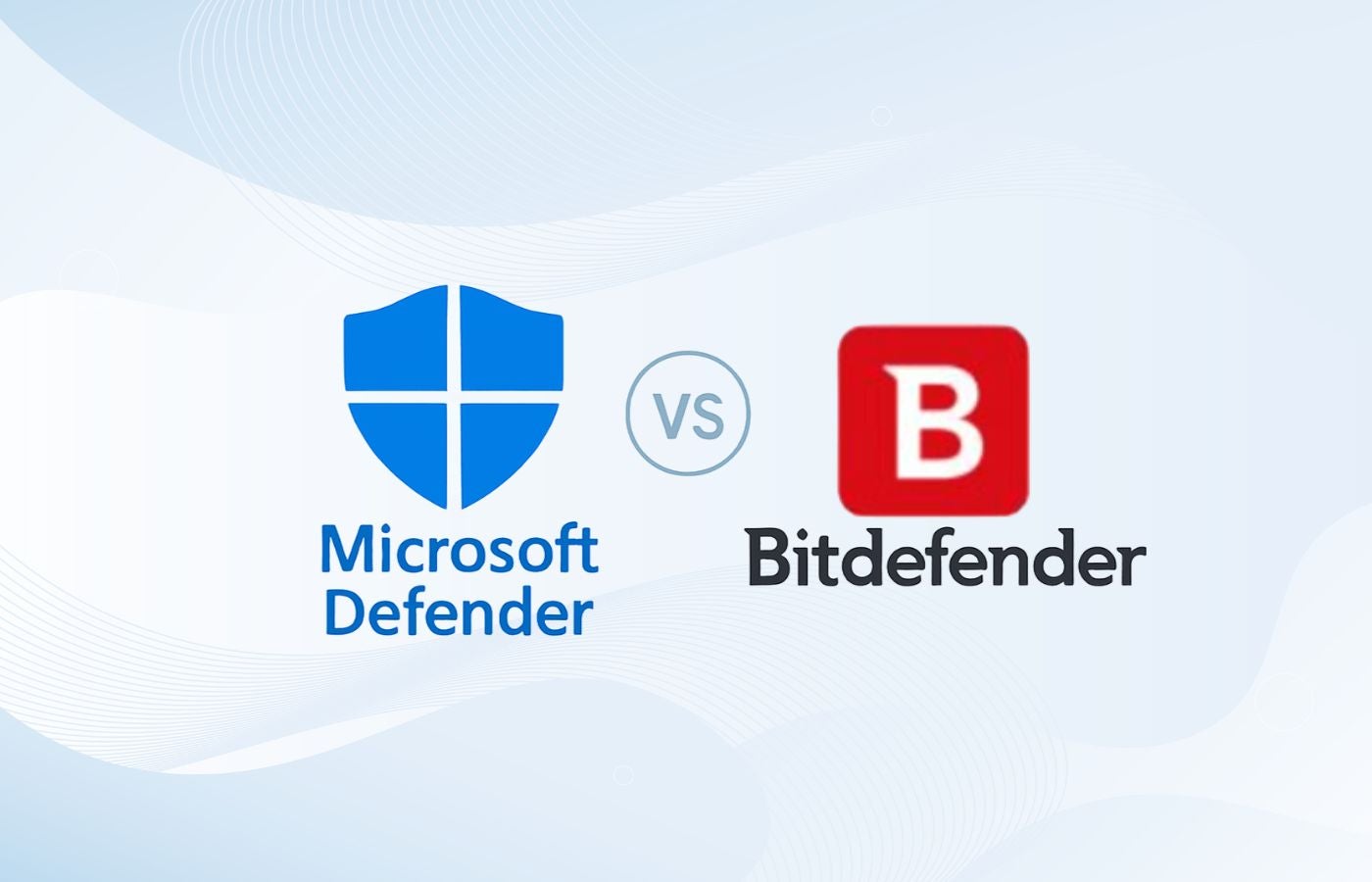An antivirus can provide peace of mind for users worried about accidentally encountering malware while scrolling online. A good antivirus can successfully detect and, in some cases, remove malware before it can seriously damage your device.
While the antivirus industry can feel overwhelmingly large, we only look at two providers today: Bitdefender and ESET Antivirus. Both pieces of software come packed with solid features, and we’ll be comparing the two to see who comes out on top. While this is my opinion, you will ultimately need to decide which antivirus product (if any) is right for you based on your specific needs and those of your business.
Bitdefender vs. ESET Antivirus at a Glance
Let’s compare some basic pricing and features between ESET and Bitdefender before going into more detail below:
 | ||
|---|---|---|
| Lowest Annual Price | $59.99 per year for the first year; $109.99 in subsequent years | $69.99 per year |
| Supported Operating Systems | Windows, MacOS, and Android** | Windows, MacOS, and Android** |
| Maximum Number of Devices Supported | 25 | 10 |
| Firewall | Yes | Yes, at middle and highest pricing tiers |
| Malware Detection Rates* | 100% | 100% |
*Malware detection rates in this table were pulled from AV-Test.org’s August 2024 Windows test. Detection rates from other websites, including AV-Comparatives, were used to evaluate the products.
** While ESET and Bitdefender both have iOS products, neither are antiviruses and will not be considered for this article
Overall, Bitdefender and ESET Antivirus are fairly inoffensive as far as antiviruses go, in my opinion. They don’t do much to stand out from the broader industry, nor each other. I think that if you were to choose an antivirus product to protect yourself or your business, both are fine options.

Bitdefender Overview
Overall Rating: 3/5
- Pricing: 2/5
- Core Features: 5/5
- Advanced Features & Integrations: 5/5
- Customer Support: 3/5
- Impact on Device Performance: 2/5
- Trustworthiness: 2/5
Bitdefender as a platform is acceptable. Antiviruses are annoying to set up and operate, with persistent notifications and severely impacting device performance. While my device did slow down to crawl while using Bitdefender on Windows, its notifications didn’t have much of the fearmongering you expect from an antivirus platform, which is always nice to see.
Daily scanning can also be a nice touch, even if it’s part of why Bitdefender slowed down my machine. The service also performed well in independent testing from websites like av-test.org and AV-Comparatives.
The product’s cons are fairly noticeable, unfortunately. The aforementioned device slowdown was significant and a pain to deal with, as with most antiviruses. Its add-ons are pricey, meaning any additional features you might want can eat into your wallet as much as the software eats into your speeds. Finally, turning off my subscription’s auto-renewal finally cut off my ability to use some features, mostly in the customer support area.
Overall, business readers are better off checking out the company’s endpoint detection response (EDR) solutions instead.
As for reputation, Bitdefender sits solidly in the middle of the pack when compared to the rest of the industry: mostly solid but with some bits that give us pause. Although its researchers have done good work, like discovering critical webOS flaws in early 2024, the company’s servers were hacked in 2015, compromising business clients’ passwords.
More damning than the breach itself, these passwords turned out to be unencrypted, which means the company stored this sensitive information without doing even the bare minimum to protect users if a breach occurred. Of course, this was almost a decade ago, and it’s reasonable to believe the company has taken steps to fix this perplexing mistake. However, it makes me wary of trusting Bitdefender with my sensitive information.
Pros & Cons
| Pros | Cons |
|---|---|
| Good independent testing results | Slows device performance to a crawl |
| Notifications aren’t annoying or overly intrusive | Expensive add-ons |
| Daily scans | Shutting off auto-renewal can block your access to some features |

ESET Antivirus Overview
Overall Rating: 3.5/5
- Pricing: 2/5
- Core Features: 4/5
- Advanced Features & Integrations: 5/5
- Customer Support: 4/5
- Impact on Device Performance: 2/5
- Trustworthiness: 3/5
ESET as an antivirus is alright. Notably, it only registered two false alarms in AV Comparative’s most recent testing, placing it only behind Trend Micro and Kaspersky, each with one false alarm. High scores like these in independent testing are always nice to see.
I was also a fan of its Device Control system when I tested the service. This lets you configure the platform to meet your specific needs, including setting device-specific rules. It can let you block or restrict access privileges for external devices. Theoretically, this could help stop someone using a Bluetooth device to hack your machine. While nice, the platform is fairly expensive, and I’m not sure the whole package is worth the admission price.
Price is one of the key issues with ESET as a product, but it’s not the only one. As much as I liked the Device Control features, they make the service more complicated, which can burden users who lack the technical knowledge to configure it properly. On top of that, ESET’s impact on device performance was significant, which is expected from an antivirus but is never great to see.
Aside from a 2018 antitrust lawsuit, its reputation is mostly fine, which I can’t always say about antivirus providers. There’s no history of major data leaks, aside from its security forums being breached back in 2014. While this isn’t great, you sometimes must grade on a curve with antivirus providers.
Pros & Cons
| Pros | Cons |
|---|---|
| Device Control features are great for customization | Might be too complicated for less tech-savvy users |
| Scored high in independent testing | Pretty expensive |
| Large impact on device performance |
Best for Pricing: Bitdefender & ESET Antivirus
 | ||
|---|---|---|
| Lowest Pricing Tier (Billed Annually) | $59.99 per year for the first year; $109.99 in subsequent years | $69.99 per year |
| Mid-Range Pricing Tier (Billed Annually) | $79.99 per year for the first year; $129.99 per year in subsequent years | $79.99 per year |
| Highest Pricing Tier (Billed Annually) | $99.99 per year for the first year; $159.99 per year in subsequent years | $179.99 per year |
| Free Trial | 30 days | 30 days |
* ESET pricing starts lower in the lowest and mid-range pricing tiers but only covers 3 devices. The prices shown above are for 5-device coverage to match up with Bitdefender’s default 5-device coverage.
Winner: While Bitdefender is slightly cheaper in the first year, the significant jump from year two and onward makes it tough to really differentiate between the two in the pricing category. Regardless, both platforms are fairly overpriced for what they offer.
Best for Core Features: Bitdefender
 | ||
|---|---|---|
| Endpoint Scanning | Yes | Yes |
| Antimalware | Yes | Yes |
| Web Browsing Protection | Yes | Yes |
| Ad Blocking | Yes, at higher pricing tiers | No |
Winner: Bitdefender and ESET are nearly identical in core features, but an ad-blocker at higher pricing tiers gives Bitdefender a slight edge.
Best for Advanced Features & Integrations: Bitdefender
 | ||
|---|---|---|
| VPN | Yes, with limited traffic at lowest-pricing tier; unlimited traffic at middle and highest tiers | Yes, at highest pricing tier only |
| Password Manager | Yes | Yes, at middle and highest pricing tiers |
| Firewall | Yes | Yes, at middle and highest pricing tiers |
| Dark Web Monitoring | Yes, at highest pricing tier | Yes, at highest pricing tier |
Winner: Both platforms offer all the features listed above, but Bitdefender offers them at cheaper pricing tiers than ESET Antivirus, giving it a slight edge. However, this is mainly for the firewall feature. While a built-in VPN and Password Manager are nice, I’d recommend dedicated VPN and Password Manager solutions over whatever might come bundled with an antivirus.
Best for Customer Support: ESET Antivirus
 | ||
|---|---|---|
| Support Forum/Customer Community | Yes | Yes |
| Support Hours | 24/7 | 6am-5pm Pacific Standard Time Monday-Friday |
| Phone Support (With a Human Agent | Unclear | Yes |
| Email Support | Yes | Yes |
| Live Chat Support (With a Human Agent) | Unclear | Yes, after filling out a ticket |
Winner: While Bitdefender’s 24/7 support hours certainly feel better, ESET’s customer support options are more transparent in terms of knowing that you’ll be put in touch with a human. Inconvenient as it may be at times, I’d rather wait to contact the company during business hours than try to deal with a chatbot that is likely working off the same knowledge base I already have access to.
Who Shouldn’t Use Bitdefender or ESET Antivirus?
The short answer is “most people,” in my opinion. Antiviruses can be great for peace of mind. Still, the bulk of paid options, including the stars of this article, usually don’t provide enough value for your money compared to cheaper options like Microsoft Defender. There’s nothing particularly wrong with Bitdefender or ESET compared to the broader industry.
Still, I wouldn’t personally pay the prices asked by these companies to use either on my own device, and I don’t think most other individuals should either. Some businesses might find a helpful antivirus, but in many cases, I would recommend a dedicated endpoint detection response solution over an antivirus.
2 Alternatives to Bitdefender & ESET Antivirus
Bitdefender and ESET aren’t the only antivirus solutions on the market. Here are a couple of alternatives for your consideration:
Microsoft Defender
If you’re a PC user, the Microsoft Defender software with a Microsoft 365 subscription will serve your needs just as well as any more expensive, more feature-burdened platform in most cases. It scores well in virus detection tests run by reputable sites like AV-test and AV-Comparatives, and it lacks many bloatware and unnecessary features common in modern antivirus software.
It is available as part of the Microsoft 365 subscription plan, which starts at $69.99 per year. Alongside Defender, Microsoft 365 has features like identity theft monitoring, OneDrive file protection, and advanced email and calendar features for Microsoft Outlook. A Microsoft Defender for Business plan is available starting at $3 per user per month, supporting up to 300 users and up to 5 devices per user.
Malwarebytes
Malwarebytes is one of the best antiviruses on the market and one of the only ones I would install on my own devices if need be. Much like Bitdefender and ESET, it scores well in virus detection tests while not having as large an impact on your performance as either piece of software. Malwarebytes has plans starting at $3.75 per month for individual users.
Its Teams plan targets businesses and organizations, starting at $119.97 per year for 3 devices. Its Teams plan can support up to 20 devices. Managed detection response and EDR solutions for businesses are also available.
How I Compared Bitdefender & ESET Antivirus
To grade Bitdefender and ESET Antivirus on a roughly even playing field, I created a grading rubric with 6 categories that interested buyers should consider when deciding which antivirus to buy. Two categories (Trustworthiness and Impact on Device Performance) did not get a dedicated section due to there not being much to compare within the format of this article. Still, they were briefly discussed in the overview for both products.
Pricing – 15%
I examined each company’s leading consumer products (Bitdefender’s all-in-one security packages and ESET’s For Home packages) and their pricing plans. Free trials and several supported devices were also considered.
Core Features – 20%
I evaluated the availability of basic antivirus features for both Bitdefender and ESET Antivirus. Basic features included endpoint scanning and web browsing protection.
Advanced Features & Integrations – 10%
For this category, I analyzed some nice-to-haves for an antivirus, including a firewall and dark web monitoring. Password Managers and VPNs were also considered, though their impact on my overall grade was minor.
Impact on Device Performance – 15%
I looked at how much each software slowed down or affected my experience using my device. This includes looking at browsing speeds and if either product’s web protection features are blocked or affected by any websites I commonly use throughout my day, like YouTube or Spotify.
Customer Support – 10%
I checked out this category’s customer support options for Bitdefender and ESET. This included determining if I could contact human customer support agents via phone or live chat, whether customer forums were available, and whether either company had 24/7 support.
Trustworthiness – 30%
Finally, I researched both companies’ histories for any notable data breaches or past shady activity, like if they had been caught selling user data. In my opinion, trust is the most important consideration factor with cybersecurity products, which is why it’s weighted so much higher than all other categories.
Bottom Line: Bitdefender vs ESET Antivirus
Overall, Bitdefender and ESET Antivirus are the same as the other products. The two might be slight differences based on reputation or some small features, but they’re not enough to meaningfully separate one another. I personally wouldn’t pay for either service, but if you’re set on choosing between these two products, I don’t think there’s a wrong answer either way.




